Related Research Articles

The prime minister of India, officially the prime minister of the Republic of India is the head of the executive branch of the government of India. The prime minister is the presiding member of the Council of Ministers of the central government and heads the federal cabinet. They can be a member of any of the two houses of the Parliament of India—the Lok Sabha and the Rajya Sabha ; but has to be a member of the political party or coalition, having a majority in the Lok Sabha.

The Indian National Congress, colloquially the Congress Party but often simply Congress, is a political party in India with widespread roots. Founded in 1885, it was the first modern nationalist movement to emerge in the British Empire in Asia and Africa. From the late 19th century, and especially after 1920, under the leadership of Mahatma Gandhi, Congress became the principal leader of the Indian independence movement. Congress led India to independence from the United Kingdom, and powerfully influenced other anti-colonial nationalist movements in the British Empire. Due to its enduring history, the Congress is often called the "grand old party".
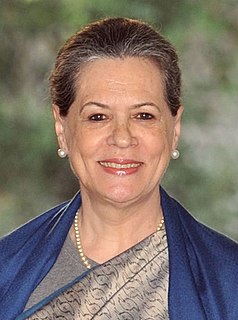
Sonia Gandhi is an Indian politician. She is the president of the Indian National Congress, a big tent political party, which has governed India for most of its post-independence history. She took over as the party leader in 1998, seven years after the assassination of Rajiv Gandhi, her husband and a former Prime Minister of India, and remained in office until 2017 after serving for twenty-two years. She returned to the post in 2019 after her son, Rahul Gandhi, resigned.

Rahul Gandhi is an Indian politician and a member of the Indian Parliament, representing the constituency of Wayanad, Kerala in the 17th Lok Sabha. A member of the Indian National Congress, he served as the president of the Indian National Congress from 16 December 2017 to 3 July 2019. Gandhi is the chairperson of the Indian Youth Congress, the National Students Union of India also a trustee of Rajiv Gandhi Foundation and Rajiv Gandhi Charitable Trust.
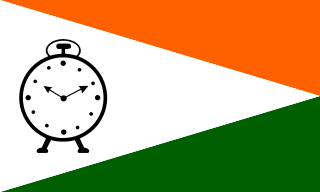
The Nationalist Congress Party is one of the eight national parties in India.

Manmohan Singh is an Indian economist, academic, and politician who served as the 13th Prime Minister of India from 2004 to 2014. Currently, he is a Member of Parliament in the Rajya Sabha, representing the state of Rajasthan. A member of the Indian National Congress, Singh was the first Sikh Prime minister of India. Singh was also the first prime minister since Jawaharlal Nehru to be re-elected after completing a full five-year term.

United Progressive Alliance (UPA) is a big tent centre-left political alliance of predominantly left-leaning political parties in India formed after the 2004 general election. The largest member party of the UPA is the Indian National Congress (INC), whose president Sonia Gandhi is chairperson of the UPA. It formed a government with support from some other left-aligned parties in 2004 after no single party could get the majority on its own.

Jairam Ramesh is an Indian economist, historian and politician belonging to Indian National Congress. He is a Member of Parliament representing Karnataka state in the Rajya Sabha. In July 2011, Jairam was elevated to the Union Council of Ministers of India and appointed Minister of Rural Development and Minister of the new Ministry of Drinking Water and Sanitation. However, in the cabinet reshuffle in October 2012, he has been divested of the portfolio of Ministry of Drinking Water and Sanitation. He was previously the Indian Minister of State at the Ministry of Environment and Forests from May 2009 to July 2011.

The Rajiv Gandhi Foundation was established on 21 June 1991. The foundation works on a range of issues including literacy, health, disability, empowerment of the underprivileged, livelihoods and natural resource management. Its current focus areas are community welfare, literacy, health and special programmes for children and women. All donations to the Foundation are tax deductible to the extent of 50 percent under section 80G of the Income Tax Act.

Harsh Mander is an Indian author, columnist, researcher, teacher, and social activist who started the Karwan-e-Mohabbat campaign in solidarity with the victims of communal or religiously motivated violence. He is the Director of the Centre for Equity Studies, a research organisation based in New Delhi. He also served as Special Commissioner to the Supreme Court of India in the Right to Food Campaign and was a member of the National Advisory Council of the Government of India, set up under the UPA government.

General elections were held in India in five phases between 16 April 2009 and 13 May 2009 to elect the members of the 15th Lok Sabha. With an electorate of 716 million, it was the largest democratic election in the world until being surpassed by the 2014 general election.
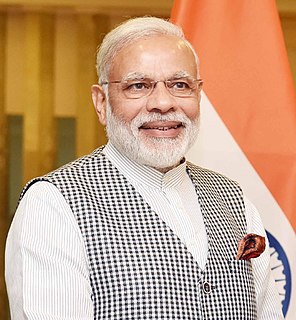
General elections were held in India in nine phases from 7 April to 12 May 2014 to elect the members of the 16th Lok Sabha. With 834 million registered voters, they were the largest-ever elections in the world until being surpassed by the 2019 elections. Around 23.1 million or 2.7% of the total eligible voters were aged 18–19 years. A total of 8,251 candidates contested the 543 elected Lok Sabha seats. The average election turnout over all nine phases was around 66.40%, the highest ever in the history of Indian general elections.
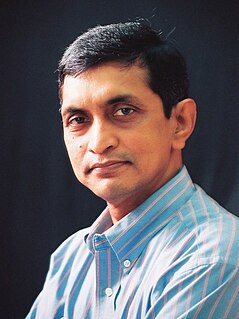
Jaya Prakash Narayana, is an Indian liberal politician and activist. He is the founder and president of Lok Satta Party. He served as a Member of the Legislative Assembly from Kukatpally constituency of Andhra Pradesh in India. In May 2014, he contested from Malkajgiri as a Member of Parliament and lost.
Economic Advisory Council to the Prime Minister (PMEAC) is a non-constitutional, non-permanent and independent body constituted to give economic advice to the Government of India, specifically the Prime Minister. The council serves to highlight key economic issues facing the country to the government of India from a neutral viewpoint. It advises the Prime Minister on economic issues like inflation, microfinance, and industrial output.
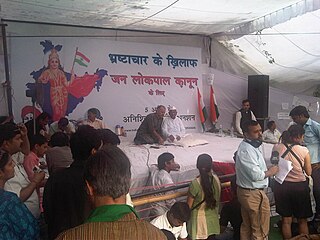
The Indian anti-corruption movement was a series of demonstrations and protests across India that began in 2011 and was intended to establish strong legislation and enforcement against perceived endemic political corruption. The movement was named as one of the "Top 10 News Stories of 2011" by Time magazine.
The National Integration Council (NIC) is a group of senior politicians and public figures in India that looks for ways to address the problems of communalism, casteism and regionalism. Council members include cabinet ministers, entrepreneurs, celebrities, media heads, chief ministers, and opposition leaders. The 2013 council was chaired by Prime Minister Manmohan Singh, and its members included movie star Jaya Bachchan, cardinal Baselios Cleemis, news editors: Shobhana Bhartia, Siddharth Varadarajan, Aroon Purie, Barkha Dutt, political leaders; Rajnath Singh, Kumari Mayawati, Bhim Singh, Sonia Gandhi, and billionaires; Anand Mahindra, Rajashree Birla, Cyrus Mistry, and Azim Premji.

The 2012 Indian Vice-Presidential election was held on 7 August 2012 to elect the Vice-President of India. Mohammad Hamid Ansari was the incumbent and the UPA candidate. The other prime candidate was the NDA's Jaswant Singh.
Ajay Agarwal is a lawyer in the Supreme Court of India and a politician. He is the candidate representing the Bharatiya Janata Party from Rae Bareli in the 2014 Indian general election. During his tenure on the Supreme Court, he filed public interest litigations in several cases including the Bofors scandal, the Taj corridor case, and the fake stamp paper scam run by Abdul Karim Telgi.
The Indian National Congress (INC) is one of the two major political parties in India. The prominent members of the party are the president Sonia Gandhi, vice-president Rahul Gandhi, former prime minister Manmohan Singh and Priyanka Gandhi. INC took part in the elections alongside other members of the United Progressive Alliance. On the fourth anniversary of the second United Progressive Alliance government, the INC announced that its campaign for the election would be led by Prime minister Manmohan Singh, party chairperson Sonia Gandhi, and general secretary Rahul Gandhi.
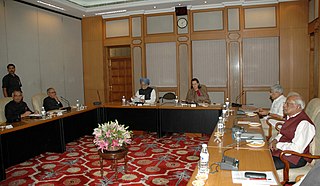
The UPA-Left Coordination Committee was a platform dedicated to coordinate policy discussions between the Indian National Congress and the parliamentary left-wing parties during the UPA I cabinet governing India 2004–2009. During this period the parliamentary left parties were providing outside support to the government, without being part of the governing coalition as such.
References
- ↑ "Sonia Gandhi returns as Head of National Advisory Council (NAC)". NDTV. 29 March 2009. Retrieved 25 November 2017.
- ↑ "About Us: Planning Commission, Government of India". Planningcommission.nic.in. Retrieved 9 February 2014.
- ↑ "Shri Ashis Mondal, Member NAC". National Advisory Council, Government of India. Archived from the original on 28 January 2013. Retrieved 13 September 2019.
- ↑ Smita Gupta (10 June 2010). "Manmohan acknowledges key role of NAC". The Hindu. Retrieved 9 February 2014.
- ↑ Jayaprakash Narayan (Lok Satta)
- ↑ Archived 22 September 2010 at the Wayback Machine
- ↑ Mathew Idiculla (2 June 2010). "NAC: think tank, super cabinet or unconstitutional?". GovernanceNow.com. Retrieved 9 February 2014.
- ↑ "'Formation Of Nac Unconstitutional; Sonia Super PM'". Financial Express. 19 July 2004. Retrieved 9 February 2014.
- ↑ "Sonia as NAC head is psuedo-Constitutional[sic] power centre: BJP". Indian Express. 30 March 2010. Archived from the original on 8 January 2016. Retrieved 9 June 2016.
BJP on Tuesday said that Congress President Sonia Gandhi's appointment as Chairperson of National Advisory Council has created a 'psuedo-Constitutional power centre' which would lead to 'redundancy' of the post of Prime Minister.
- ↑ "624 Comment". India-seminar.com. Retrieved 9 February 2014.
- ↑ Archived 12 August 2013 at the Wayback Machine
- ↑ "Laws for citizens, and by them too". Indian Express. 20 May 2013. Retrieved 9 February 2014.
- ↑ R. Jagannathan, "9 reasons why the Communal Violence Bill is itself communal", Firstpost, 30 May 2011.